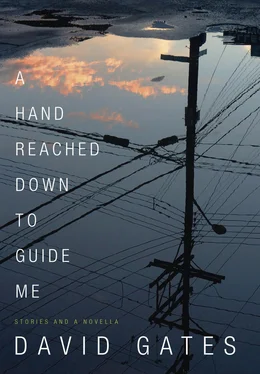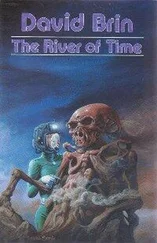“Did you,” Barbara said. “Well, then, you know. What about we all settle in Vermont and help Kenny revive the drama.”
“Did I hear my name?” Kenny sat down next to me. “They treating you right here?”
“Half price, can you imagine?” Barbara said. “Anything on the whole menu, from what I could gather. They didn’t say about the drinks, though.”
“Mother of Mercy,” he said. “Okay, I’ll take care of this.”
“Kenny’s a big man in this town,” I said.
“I was. You degenerates are ruining my good name.” He leaned closer to me and said, “Playing a little rough, aren’t we?” He stood up. “Let me see if I can awaken our host’s bounty.”
We dropped Barbara at Blue Jay Way, a Victorian house painted San Francisco style, with a wooden sign out front that showed an officious-looking bird chirping on a twig. I got into the front seat, and Kenny said, “I expect Barbara to be snotty. Believe me, I know how pathetic this must seem to you.”
“Come on, you know what my life is,” I said. “And everybody here seems to like you.”
“Well, yes, of course, hello , this is the new NPR Vermont—it’s now a hate crime not to have David Sedaris on your iPod.” There were no other cars out, but he put on his blinker to turn onto the street that led toward his house; only then did I spot a police cruiser with its lights off parked next to the drive-in bank. “Those fuckers,” he said. “Pull you over for not having your hands at ten and two. When Rick and I started coming up here, somebody left a dead dog in the mailbox, little miniature poodle or something. Dressed it up in a baby’s pink T-shirt. I’ll never get over it. You know what they said? ‘Call animal control.’ And then Rick would piss and moan because I kept a shotgun under the bed.”
“Jesus. Well, so things are better, no?”
“Any sane person would think so. Even I think so. But I have to tell you, back then they really got who you were. Like: a man who did dirty things to men. So now I’m our oh-so-charming gay theater guy. I mean, who wrote this shit? Why am I doing fucking Shakespeare? Why am I not doing Genet?”
“Because Genet’s terrible?” I said.
“Well, if you’re going to be rational about it.” He put on his blinker again and took the road that went past a pine-smelling sawmill, lit by a couple of bluish floodlights, then up a steep grade along a rocky stream. “I don’t know, I just want to have my nice house on the hill, put on a nice little show for the nice people. This is what it’s gotten down to.”
“Listen, you’re a good man,” I said. “I’m going to do my best for you.”
“ You’re a good man,” he said. “I think I drank too much again.”
—
“Daily, as we rehearse together,” old Granville-Barker wrote of his production of Twelfth Night , “I learn more what it is and should be; the working together of the theater is a fine thing.” I just wish you could have seen Julia as Olivia, in the scene where Malvolio comes in with his yellow stockings and she can’t imagine what’s gotten into him: she and Kenny worked out this business where she first had her hands over her mouth, then covered her eyes and watched Malvolio through her fingers, then let out a giggle—just one—despite herself. And meanwhile there was Barbara—always a joy to watch her—trying to keep a straight face as Maria. And even our Malvolio, who’d volunteered because he thought some “acting experience” might help his teaching: Kenny had him worming a finger under his cross-gartering as he said, “And some have greatness thrust upon them.” I’m not saying this was magical—I remember what magical was—but I was standing next to Kenny in the wings and saw him nodding yes.
Julia and Sir Andrew didn’t seem to be speaking. A couple of days after their little display at the Mexican restaurant, she and I were out front, watching the scene where he tells Sir Toby, “Your niece will not be seen; or if she be, it’s four to one she’ll none of me,” and he gave us both a look. “Whoa, whoa,” Kenny said, “why the stinkeye? Can we keep the fourth wall in place, people?” She put a hand next to my ear and whispered, “He needs to grow up.”
The morning of the dress rehearsal, the Eye on the Sky weather forecast was calling for ninety degrees, so we set up fans on the stage. I was sweating under my Beckett greatcoat, and I could see Julia was suffering in the long black mourning dress she had to wear in the first act. The prompter, an English teacher who’d retired from the local high school, had nodded off by the time we got to the recognition scene; poor Sebastian looked right, looked left—his bewilderment was actually more credible than he’d been able to make it before—and then went into improv: “O Viola, is it really thee?” By the time I had to sing “O mistress mine,” the guitar I’d borrowed from—now I’ve lost his name again, you know, Sir Toby—had gone out of tune. “Dress rehearsal is always a disaster,” Kenny told us. “Go home, forget about it, and tonight we fucking kill.”
After the performance, Julia’s parents had the cast over to their house on the village green: your standard-issue New England Federal, three stories, white clapboards, black shutters, oval plaque reading BUILT 1814 beside the front door. In the backyard they’d strung up chili-pepper lights and set out crudités, earthenware bowls of whitish dips, plastic glasses, a Manhattan skyline of bottles. Malvolio, who’d just promised to be revenged on the whole pack of us, was tapping a microphone while Sir Toby tuned his guitar; they’d been working up a “special” song together. Sebastian, still wearing his soldier jacket with the frogging, was pouring wine for Viola, who’d changed into jeans and a peasant top. No sign of our Sir Andrew. Julia was still in costume too—the white dress she wore in the last act, cut to make the tops of her pale breasts bulge out—and splashing liquor from her glass as she put an arm around Barbara Antonelli. I started for her, but Kenny touched the back of my arm and brought me over to the mother—a puffy-faced woman my age, whose wooden beads rattled at her tanned bosom when I air-kissed her—and then the father. “Tom,” he said, sticking out a hand. “You’re quite the actor, aren’t you? Even I could see that.”
“Didn’t I tell you?” Kenny said. “You’ll excuse me, I need to go over and pay homage to La Antonelli.”
“I shouldn’t be admitting this,” Tom said to me, “but I haven’t seen a real Shakespeare since I was at Yale—well no, that’s not true, we did see Julia when she was Puck, in sixth grade. Of course, as a father, the leading lady was the whole show.”
“I’ve been very impressed,” I said. “Kenny thinks the world of her.”
“Well, we all think the world of Kenny. He does a lot for this community—a lot for this family . He won’t tell you, but he’s the one who got her into Middlebury. He knows one of the muckety-mucks. You’ll never hear anybody say a word against Kenny Donnelly.”
Julia came over and put an arm around her father. “Kenny says I was naughty.” She reached out with the hand holding the glass and touched a finger to my nose—as she’d done in our first scene. (I’d sneaked a look at Kenny in the wings and saw him throw up his hands.) “I still think it worked.”
I saw the father’s face get red. “What was this?”
She kissed his fat cheek and said, “Just actor shit. Did you like me?”
“Hey, hey,” he said. “Language.” She took her arm away and touched my nose again.
“We tend to argue over the fine points,” I said, keeping my eyes off her breasts. “I doubt people out there even notice this stuff.”
Читать дальше











